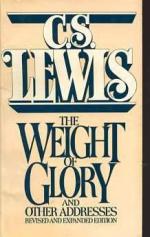
|
| Name: _________________________ | Period: ___________________ |
This test consists of 15 multiple choice questions and 5 short answer questions.
Multiple Choice Questions
1. In his discussion of right and wrong, Lewis says that any concrete train of reasoning involves all but which of the following elements?
(a) Arranging facts.
(b) Making decisions.
(c) Self-evident truth.
(d) Reception of facts.
2. Lewis believes, as stated in his discussion of transpositions, that the doctrine provides a background needed for which of the following virtues?
(a) Love.
(b) Hope.
(c) Peace.
(d) Unselfishness.
3. When discussing mental exercises to defend the scholar against war, what does Lewis give as the second enemy?
(a) Frustration.
(b) Excitement.
(c) Fear.
(d) Love.
4. What sort of fanatic does Lewis describe in "Why I am Not a Pacifist" who has an unanswerable intuition that strong drink is wrong?
(a) Temperance.
(b) Excess.
(c) Control.
(d) Sobriety.
5. In "Transposition", Lewis says that if anyone watches the relationship between emotions and sensations he will discover all but which of the following?
(a) Nerves have fewer resources than emotion.
(b) Nerves do respond to emotions.
(c) Emotion is separate and unconnected.
(d) Senses use one sensation to express multiple emotions.
6. In "Transposition", Lewis says that we are claiming to know that our desire for heaven was not merely a desire for all but which of the following?
(a) Money.
(b) Jewelry.
(c) Longevity.
(d) Social splendor.
7. In "Why I am Not a Pacifist" Lewis says that were he to be a Pacifist, he would go against the writings of all but which of the following?
(a) Plato.
(b) Cicero.
(c) Aristotle.
(d) Gandhi.
8. Lewis states in his discussions of different virtues that the negative idea of unselfishness carries the primary suggestion of what?
(a) Being the right kind of person.
(b) Securing good for others.
(c) Reaching a truly enlightened state.
(d) Going without good things ourselves.
9. In the discussion of how to respond to military service, Lewis states that the decision is generally made by what?
(a) Religion.
(b) Government.
(c) Conscience.
(d) Individuals.
10. When discussing how we should decide a question of morals, Lewis states that every moral judgment involves all but which of the following?
(a) Intuition.
(b) Reasoning.
(c) Facts.
(d) Precedent.
11. When discussing the idea of glory, Lewis says that it is perhaps crude but also accurate to describe glory as what?
(a) Being noticed by God.
(b) An inner peace.
(c) A means to an end.
(d) The ultimate sacrifice.
12. What emotion does Lewis say he feels when discussing the desire for heaven?
(a) Depression.
(b) Shyness.
(c) Impatience.
(d) Anger.
13. Lewis describes, in "Why I am Not a Pacifist," a belief that human history is a unilinear movement from worse to better. What term does he use for this belief?
(a) Reason.
(b) Life.
(c) Logic.
(d) Progress.
14. In "Learning in War-time", Lewis says that the tendency of Christians to avoid mentioning heaven or hell is what?
(a) Spiritual prudery.
(b) Wishful thinking.
(c) Great wisdom.
(d) Foolish nonsense.
15. When discussing mental exercises to defend the scholar against war, what does Lewis give as the first enemy?
(a) Love.
(b) Frustration.
(c) Fear.
(d) Excitement.
Short Answer Questions
1. In "Transposition", Lewis says that we often feel as though the vision of God will destroy our nature and that this feeling underlies our use of all but which of these words?
2. According to Lewis in "Learning in War-time", if you don't read good books what will happen?
3. Lewis opens "Why I am Not a Pacifist" by saying military service can be all but which of the following?
4. While talking about duty in wartime, Lewis says that God's claim on us is which of the following?
5. According to Lewis in "Learning in War-time", the true perspective on the calamity of war is what?
|
This section contains 605 words (approx. 3 pages at 300 words per page) |

|




